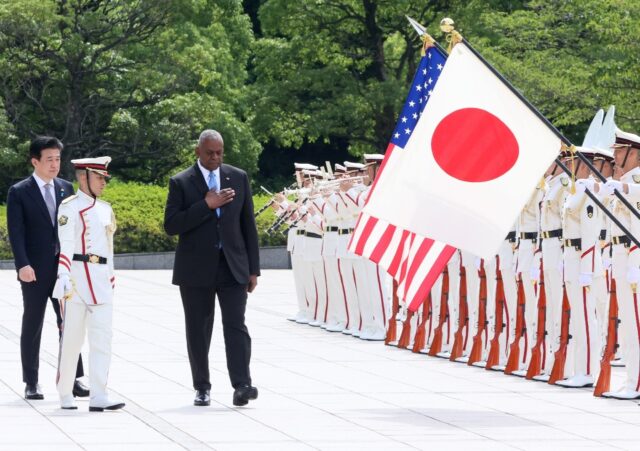The United States and Japan issued scathing verbal attacks on China and Russia on Sunday after high-level discussions on enhancing already close defence collaboration between Tokyo and Washington in an increasingly unstable region.
A joint statement issued after “2+2” talks in Tokyo between US Secretary of State Antony Blinken, Defense Secretary Lloyd Austin and their Japanese counterparts said China’s “foreign policy seeks to reshape the international order for its own benefit at the expense of others”.
They also reiterated their “strong objections” to China’s “unlawful maritime claims, militarization of reclaimed features, and threatening and provocative activities in the South China Sea”.
The communique also criticised Russia’s “growing and provocative strategic military cooperation” with China, as well as Moscow’s procurement of ballistic missiles and other materiel from North Korea “for use against Ukraine”. It also expressed alarm at China’s “ongoing and rapid expansion of its nuclear weapons arsenal”.
Blinken said US alliances were all “defensive in nature”.
“They have no ambitions toward anyone else, and never have been or ever will be offensive in nature,” he told a news conference.
“But at a time when unfortunately these threats are increasing, our alliances, our partnerships, they’re getting deeper, they’re getting stronger, they’re getting more effective,” he said.
Japanese Foreign Minister Yoko Kamikawa said: “We are at an historic turning point.”
“Developments that shake the very foundation of free and open international order based on rule of law are continuing.”
“We must deepen and develop the US-Japan alliance to safeguard the international order and enhance deterrence,” she said.
China claims the South China Sea, through which trillions of dollars of trade passes annually, almost in its entirety, while Tokyo and Beijing are also at loggerheads over disputed Japan-controlled islands in the East China Sea.
Three-star general
The statement also confirmed US plans to establish in Japan a new Joint Force Headquarters, headed by a three-star US commander, for the 54,000 US military personnel stationed there.
It will serve as a counterpart to Japan’s planned Joint Operations Command for all its armed forces, making the two militaries more nimble in the case of a crisis over Taiwan or the Korean peninsula.
US forces in Japan currently report back to Indo-Pacific Command in Hawaii, around 6,500 kilometres (4,000 miles) away and 19 hours behind Tokyo.
Japan and the United States also agreed to enhance planning for contingencies and “improve and expand” the scope of joint training and exercises.
Japan has been shedding its strict pacifist stance in recent years, ramping up defence spending and moving to obtain “counterstrike” capabilities.
President Joe Biden and Prime Minister Fumio Kishida announced a “new era” in cooperation at a summit at the White House in April.
Japan and the Philippines — Blinken’s and Austin’s next stop for a “2+2” — signed a defence pact this month that will allow the deployment of troops on each other’s territory.
That followed the first trilateral summit between the leaders of Japan, the Philippines and the United States in Washington in April.
Camp David
Japan and South Korea, like the Philippines, have also moved to bury the hatchet over World War II, with Biden hosting both countries’ leaders at Camp David last August.
Austin and Japanese Defence Minister Minoru Kihara held talks with Shin Won-sik, the first South Korean defence minister to visit Japan in 15 years, ahead of the Japan-US “2+2” meeting.
They signed a memorandum of cooperation to further tighten ties, including information sharing and trilateral exercises.
“Trilateral cooperation among Japan, the United States and South Korea has become stronger and unshakable even under various changes in the international situation,” Kihara told reporters.
The discussions between Japan and the United States also covered enhancing Washington’s “extended deterrence” commitment to use its military capabilities, including nuclear weapons, to protect Japan.
China’s military modernisation, North Korea’s nuclear and missile work, and nuclear sabre-rattling in the Ukraine war have unsettled Japan, said Naoko Aoki, a political scientist at the RAND think tank.
“(It) is important for the United States to reassure Japan of its commitment and signal to potential adversaries that the alliance remains strong and that the United States is committed to using nuclear weapons if necessary to defend Japan,” she told AFP.
On Monday, Blinken and Kamikawa will meet S. Jaishankar and Penny Wong, their Indian and Australian counterparts in the Quad, an alliance seen as a bulwark against China.

COMMENTS
Please let us know if you're having issues with commenting.